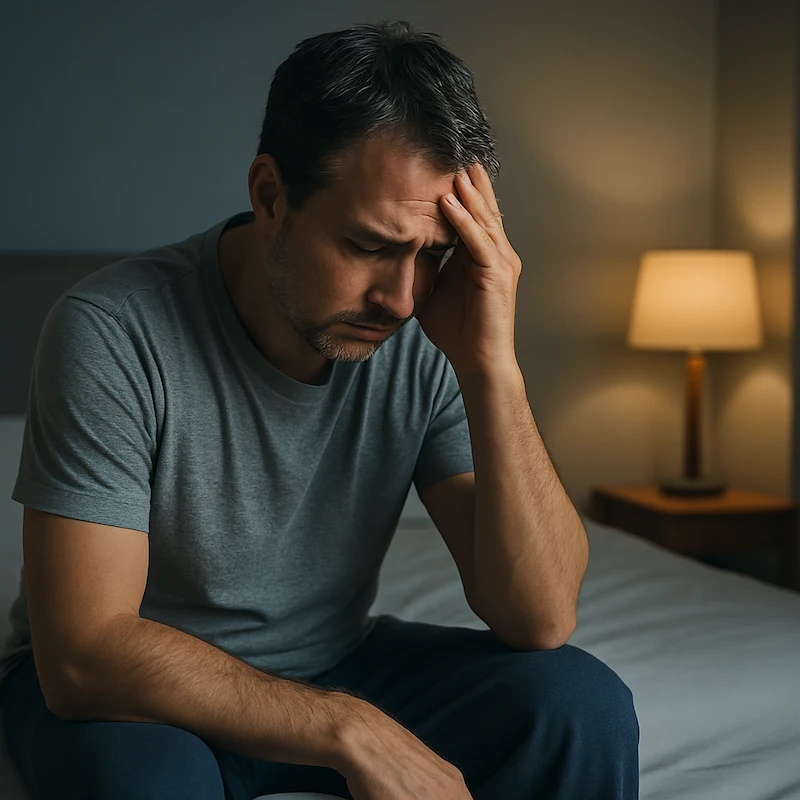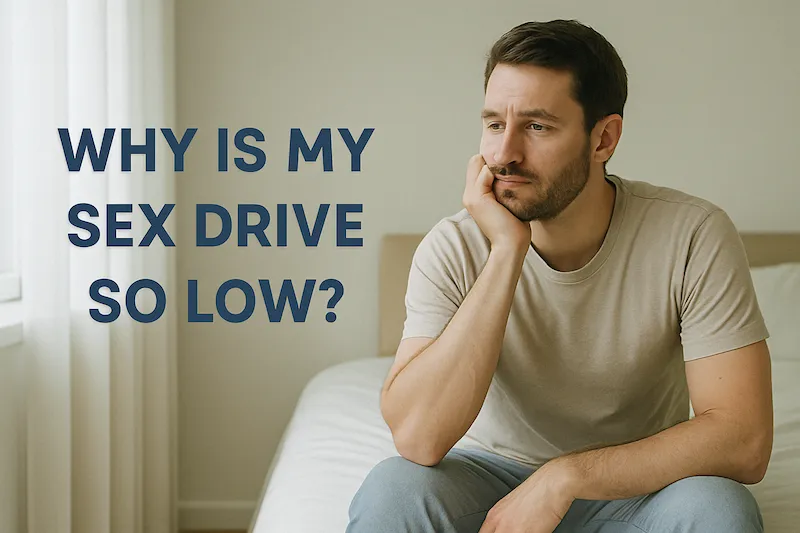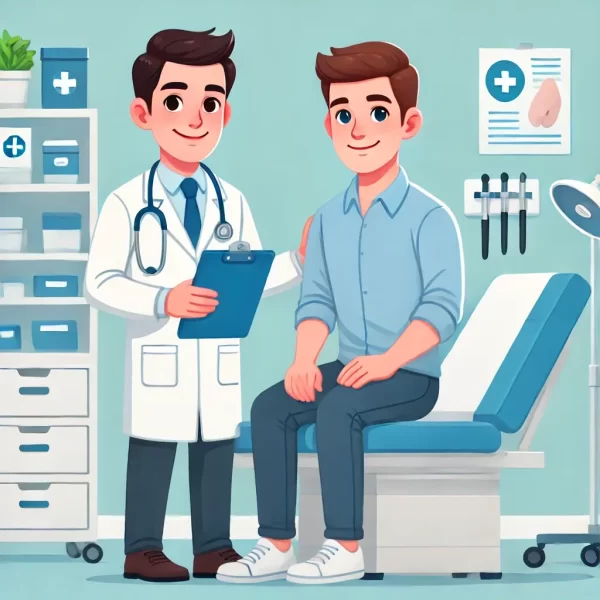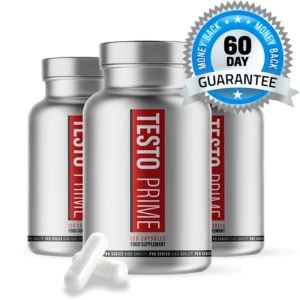Losing interest in sex can feel frustrating, confusing, and even alarming. Whether it’s a sudden drop or a gradual decline over time, having a low sex drive—also known as low libido—is more common than you might think. It can affect anyone, regardless of age or gender, and it often signals an underlying physical, emotional, or lifestyle issue.
Your sex drive is deeply connected to your hormones, mental health, and overall well-being. When something goes off balance—like your testosterone levels, stress levels, or even your sleep—it can lead to noticeable changes in sexual desire.
In this article, we’ll explore the top 9 most common reasons why your sex drive might be low and share natural, effective strategies to help you reignite your desire and regain confidence in your sex life.
👉 If you’re concerned that hormone imbalance might be playing a role, check out our detailed guide on Low Testosterone in Men.
What Is Low Sex Drive?
Low sex drive, or low libido, refers to a reduced interest in sexual activity. While everyone’s sex drive fluctuates naturally over time, a persistent lack of desire—especially if it causes distress or affects your relationship—could indicate an underlying issue.
It’s important to distinguish between low libido and other sexual health concerns. For example:
- Low libido means you have little or no desire for sexual activity.
- Erectile dysfunction (ED) is the inability to get or maintain an erection but doesn’t necessarily involve a lack of desire.
- Premature ejaculation or anorgasmia (inability to orgasm) may be performance-related but not always linked to libido.
Common signs of low sex drive include:
- Little to no interest in sexual activity or fantasies
- Avoiding intimacy with a partner
- Feeling emotionally disconnected from sex
- Lack of spontaneous sexual thoughts or arousal
While a temporary dip in libido isn’t usually a cause for concern, persistent low desire could be a sign of something more significant—especially if it impacts your relationship or self-esteem.
9 Most Common Causes of Low Libido
A sudden—or even gradual—decline in sex drive can be disorienting. But libido is not a standalone function. It’s deeply influenced by your hormones, emotional state, physical health, lifestyle habits, and even your relationship quality. Let’s explore the most common, science-backed reasons for low libido—and how they might apply to your life.
1. Low Testosterone Levels
Testosterone is the primary hormone responsible for sexual desire in men and also plays a role in women’s libido. According to a study published in the Journal of Clinical Endocrinology & Metabolism, testosterone levels decline 1% each year after age 30 in men, often leading to decreased sex drive, lower energy, and erectile issues.
Signs that low T might be affecting your libido:
- You no longer experience morning erections as frequently
- You feel more irritable, tired, or mentally foggy
- Muscle mass and strength are noticeably lower
- You have little interest in sex, even with stimulation
👉 If these signs sound familiar, check our full guide on Low Testosterone in Men, including natural and medical solutions.
2. Chronic Stress and Elevated Cortisol
Stress is one of the most underestimated libido killers. When you’re stressed—about work, finances, parenting, or even sex itself—your body produces high levels of cortisol, which suppresses testosterone and interferes with sexual arousal.
In one study from Psychosomatic Medicine, men with higher cortisol levels showed significantly reduced sexual arousal and response to erotic stimuli. Chronic stress also leads to sleep problems and fatigue, further compounding the issue.
💡 Real-life example: Many couples report a decline in sexual intimacy during times of job loss, deadlines, or after the birth of a child—not because of lack of love, but because the body is in “survival mode.”
3. Depression and Mental Health Disorders
Depression not only diminishes pleasure in life but also drains your motivation for sex. Even mild depression can lead to apathy toward intimacy. What makes matters worse? The very medications used to treat depression—especially SSRIs (Selective Serotonin Reuptake Inhibitors)—often list “reduced libido” as a side effect.
A 2016 review in Current Psychiatry Reports found that up to 70% of patients on SSRIs experience sexual dysfunction, including loss of interest, delayed orgasm, and erectile problems.
💬 Tip: If you’re on antidepressants and experiencing low libido, don’t stop the meds suddenly—talk to your doctor about alternatives like bupropion or therapy-based treatments.

4. Poor Sleep and Chronic Fatigue
If you’re consistently sleeping fewer than 6–7 hours a night, your libido may suffer. A study from the Journal of Sexual Medicine found that each additional hour of sleep increased women’s sexual desire by 14% the next day. Sleep helps regulate testosterone production and mood balance—both critical to sexual interest.
Sleep deprivation also leads to fatigue, low mood, poor focus, and increased stress—all enemies of a healthy sex life.
✅ Fix this: Aim for 7–9 hours of quality sleep, manage screen time before bed, and avoid caffeine or alcohol late in the evening.
5. Relationship Issues and Emotional Disconnect
Your physical desire is closely tied to emotional safety and intimacy. If there’s unresolved conflict, lack of communication, trust issues, or even emotional burnout in your relationship, your libido may retreat as a form of emotional self-protection.
You might notice:
- You’re emotionally distant from your partner
- You feel resentment or lack of appreciation
- Intimacy feels like a chore, not a shared connection
💬 Insight: Emotional disconnection often precedes physical disconnection. Investing time in non-sexual bonding—like conversation, shared activities, or therapy—can rekindle desire.
6. Unhealthy Diet and Lack of Physical Activity
What you eat and how you move affect your libido more than you think.
- High-sugar diets increase insulin resistance, which reduces testosterone.
- Trans fats and processed food increase inflammation and decrease blood flow.
- Sedentary behavior leads to poor circulation and lower mood.
Conversely, exercise boosts testosterone, improves body image, and elevates mood—all of which naturally support sexual desire.
🥦 Eat foods like: dark leafy greens, omega-3 rich fish, avocados, eggs, and nuts.
🏃♂️ Move daily: Even 20–30 minutes of walking or resistance training can make a difference.
7. Porn Overuse and Frequent Masturbation
Frequent exposure to high-stimulation pornography can rewire your brain’s reward system. This makes real-life sexual encounters feel dull or unexciting by comparison—a condition known as “porn-induced erectile dysfunction” (PIED).
Also, if masturbation becomes a compulsive stress-relief method, it may reduce anticipation and desire for partnered sex.
🔁 Tip: Try reducing or pausing porn use for 2–3 weeks (a “dopamine detox”) and notice whether your libido for real intimacy starts to return.
8. Medication Side Effects
Several classes of medications have libido-lowering effects:
- Antidepressants (SSRIs, SNRIs)
- Beta-blockers and some blood pressure meds
- Hormonal contraceptives
- Opioid-based painkillers
- Anti-anxiety medications (e.g., benzodiazepines)
🧠 If your sex drive dropped shortly after starting a new medication, bring it up with your physician. There may be alternative drugs with fewer sexual side effects.
9. Chronic Medical Conditions
Certain health issues affect libido through both physical and psychological pathways:
- Diabetes can damage nerves and reduce blood flow to sexual organs.
- Obesity lowers testosterone and self-esteem.
- Heart disease reduces circulation and stamina.
- Hypothyroidism slows metabolism and reduces energy and libido.
These conditions often require medical management, but improving diet, weight, and exercise also makes a massive difference.
When to Talk to a Doctor
It’s perfectly normal for your sex drive to ebb and flow with the seasons of life—stressful work periods, relationship changes, or simply aging can cause temporary dips in desire. However, if your libido has been persistently low for more than 3–6 months, or if it’s negatively impacting your relationship or emotional well-being, it may be time to seek professional support.

📍Key signs you should consult a healthcare provider:
- You experience a total or near-total loss of sexual desire
- Your libido has drastically changed compared to your normal baseline
- You’re having difficulty with arousal, erection, or orgasm that wasn’t present before
- You suspect a hormonal imbalance, especially low testosterone
- You recently started a new medication and noticed sexual side effects
- You feel emotionally distressed or anxious about your low libido
A doctor can help rule out or diagnose potential underlying causes such as:
- Hormonal disorders (e.g., low testosterone, thyroid dysfunction)
- Chronic illnesses like diabetes or heart disease
- Psychological conditions like depression or anxiety
- Medication-related side effects
You may also be referred for blood tests, a mental health evaluation, or even couples therapy, depending on your situation.
💬 Remember: Low sex drive isn’t a personal failure—it’s often a biological or emotional signal that something deeper needs care and attention. Getting help is a sign of strength, not weakness.
How to Get Your Sex Drive Back Naturally
Regaining your sex drive doesn’t always require prescription drugs or invasive procedures. In fact, many people find that making small, consistent changes to their lifestyle can significantly improve libido, energy, and overall confidence. Here are the most effective, science-backed strategies to naturally boost your sex drive.
1. Exercise Regularly
Physical activity is one of the most powerful libido boosters. It improves blood flow, supports healthy testosterone production, reduces stress, and enhances body image—all crucial for sexual desire.
- Weight training increases testosterone and improves muscle tone.
- Cardio exercises enhance circulation and stamina.
- Even 20–30 minutes of brisk walking per day has shown benefits in studies.
💡 A 2018 study in The Journal of Sexual Medicine found that men who exercised at least 3 times a week reported higher libido and better sexual performance than sedentary men.
2. Improve Your Diet
The right foods can support hormone production and reduce inflammation, both of which are essential for a healthy sex drive.

✅ Foods to eat more of:
- Leafy greens (boost nitric oxide for better blood flow)
- Eggs and lean proteins (support testosterone)
- Oily fish like salmon (rich in omega-3 and vitamin D)
- Avocados, berries, dark chocolate (antioxidant and libido-enhancing)
❌ Foods to avoid:
- Processed sugar
- Trans fats
- Excessive alcohol
- Soy-based products in high amounts (may affect hormone balance)
3. Take Natural Supplements
Certain herbal supplements and nutrients have shown promise in boosting libido, energy, and testosterone naturally.
Popular options include:
- Maca Root: Enhances libido and stamina
- Ashwagandha: Reduces cortisol, supports testosterone
- Tribulus Terrestris: May increase sexual desire and performance
- Fenugreek: Boosts testosterone and sexual arousal
- L-Arginine: Improves blood flow and erectile function
👉 For a full breakdown of the best natural options, check out our guide on Best Male Enhancement Pills That Actually Work
🔎 Note: Always choose supplements from reputable brands, and consult your doctor if you’re on medication.
4. Get Better Sleep
Sleep is when your body repairs itself and balances hormones—including testosterone and cortisol. Poor sleep = poor libido.
Tips for better sleep:
- Keep a consistent sleep schedule (even on weekends)
- Avoid screens and bright lights before bed
- Limit caffeine after 2 PM
- Sleep in a dark, cool, quiet environment
😴 One study found that men who slept less than 5 hours per night had 10–15% lower testosterone levels than those who got 7–9 hours.
5. Reduce Stress and Support Mental Health
Mental health is sexual health. Chronic stress, anxiety, or emotional burnout can completely shut down your libido—even if your hormones are fine.
🧘 Try: Meditation, journaling, deep-breathing exercises, spending time in nature, or seeking therapy.
For many people, talk therapy or couples counseling is one of the most effective long-term libido boosters—because it targets the emotional root of the issue.
6. Rebuild Emotional and Physical Intimacy
If you’re in a relationship, it’s important to nurture emotional connection alongside physical desire.
✅ Simple actions that can help:
- Set aside non-sexual quality time with your partner
- Communicate openly about sexual needs without blame
- Explore new forms of intimacy or foreplay
- Practice physical touch daily (cuddling, massage, holding hands)
💬 Remember: Emotional connection is often the gateway to physical intimacy—especially for long-term couples.
Myths About Low Libido
Low sex drive is often misunderstood—and surrounded by harmful myths that can leave people feeling ashamed, confused, or even broken. Let’s debunk some of the most common misconceptions so you can focus on what truly matters: understanding your body and finding real solutions.
Myth 1: Low Libido Means You’re Not Attracted to Your Partner Anymore
This is one of the most damaging myths. A drop in sex drive doesn’t necessarily reflect your feelings toward your partner.
Often, it’s caused by stress, fatigue, hormonal imbalance, or emotional issues that have nothing to do with physical attraction.
💬 In fact, many people still feel deeply in love but lack the energy or drive for sex due to life stressors or medical reasons.
Myth 2: Only Men Experience Low Sex Drive
Absolutely false. While male libido is more commonly discussed, women also experience fluctuating desire—especially during times like pregnancy, postpartum, menopause, or periods of emotional stress.
A 2020 study published in The Journal of Women’s Health found that up to 43% of women report sexual dysfunction at some point in their lives.
Myth 3: Testosterone Boosters or Viagra Are the Only Solutions
Pharmaceuticals like Viagra can help with performance, but they don’t fix low desire—especially if the cause is emotional or lifestyle-based. Likewise, not everyone with low libido needs testosterone therapy.
✅ Sustainable solutions often include a mix of lifestyle changes, emotional support, and sometimes targeted supplements.
Myth 4: Watching More Porn or Trying Kinky Things Will “Fix” It
While sexual exploration can be fun and healthy, forcing stimulation doesn’t solve the root issue. In fact, relying too heavily on external stimulation (like porn) can further desensitize your natural response over time.
Myth 5: If You Really Loved Your Partner, You’d Always Want Sex
This is simply not true. Love and libido are connected—but not the same. Your desire can fluctuate based on physical, emotional, or hormonal changes—even in the happiest relationships.
Understanding these myths can help you let go of guilt, reset expectations, and move toward practical, realistic steps for healing.
Final Thoughts
If you’ve been wondering, “Why is my sex drive so low?”—you’re not alone, and you’re not broken.
Low libido is a common, treatable issue that affects people of all ages and genders. Whether it stems from stress, hormone imbalance, emotional strain, lifestyle habits, or chronic health conditions, there are clear, actionable steps you can take to reclaim your sexual vitality.
The key is to listen to your body—not judge it.
Instead of ignoring the signals or feeling ashamed, take this as an opportunity to explore what your mind and body truly need. That might mean improving your sleep, getting active again, eating better, working through emotional blocks, or having an open conversation with your partner (or doctor).
💬 And remember: Rebuilding your sex drive is not just about sex—it’s about restoring energy, confidence, intimacy, and a deeper connection with yourself and those you love.
If you’re ready to take the next step, start with one small change today—your body and mind will thank you.





